
|
GCOOS is the Gulf of Mexico regional component of the U.S. Integrated Ocean Observing System (IOOS). Our mission is to provide timely, reliable and accurate information on the open and coastal ocean waters of the Gulf of Mexico to ensure a healthy, clean, productive ocean and resilient coastal zone.
|
|
|
|
November 2017 - In This Issue:
|
|
|
|
|
Greetings!
We recently hosted the IOOS Advisory Committee's fall meeting at the Stennis Space Center and the University of Southern Mississippi's Thad Cochran Marine Aquaculture C
enter. During the meeting, we had the opportunity to talk about priorities for the next year, which will include a number of short recommendations to the NOAA Administrator and the IOOC.
Thanks to GCOOS Board Members Bill Lingsch, Jean May-Brett, Stephen Howden, Kirsten Larsen and Pat Hogan
for joining us at the meeting and showing your support!
I also had the opportunity to showcase GCOOS during the Gulf Research Program Advisory Board meeting earlier this month in New Orleans. The board is tasked with providing strategic
leadership on program planning and implementation and I believe it's an important audience for the work that GCOOS and our partners are doing in the Gulf to improve our ocean knowledge.
But probably the most fun I've had in the last month was joining our Outreach & Education team at the annual St. Petersburg Science Festival, where we had the privilege of helping our next generation learn more about our oceans and observing systems. And for that, I'll put on a cape and mask anytime!
|
|
|
Caped Crusaders for the Oceans: Grant Craig, Jen Vreeland, Chris Simoniello, Barb Kirkpatrick, all from GCOOS, with Abbey Wakely (SECOORA) and CJ Reynolds (MBON).
|
Until next month!
P.S.
Don't forget to mark your calendars for the regional meeting of the IOOS Animal Telemetry Network. Details below.
|
|
|
Nadine Slimak, Public Relations & Content Marketing, Vetted Communications, LLC
|
|
|
Save the Date: GCOOS-Sponsored Animal Telemetry Network Workshop 
|
 GCOOS is hosting the next workshop of the IOOS Animal Telemetry Network (ATN) Jan 23-24 in New Orleans. The workshop title is "Identifying regional stakeholder needs and priorities for animal telemetry observations of marine species." GCOOS is hosting the next workshop of the IOOS Animal Telemetry Network (ATN) Jan 23-24 in New Orleans. The workshop title is "Identifying regional stakeholder needs and priorities for animal telemetry observations of marine species."
The workshop series -- one is being hosted by each IOOS regional association -- has several goals:
- Identify regional priorities for telemetry observations of aquatic species, including fishes, turtles, pinnipeds, whales and seabirds;
- Determine whether priorities could be served by an ATN baseline network;
- Examine whether the type and extent of existing telemetry assets could adequately satisfy identified requirements.
Information generated at the workshop will be used by the ATN to ensure that a concise plan for sufficient funding of the envisioned national ATN program, including infrastructure, operations, integration and coordination of assets will be achieved.
|
|
|
Specific workshop objectives include:
- Identifying and prioritizing regional telemetry stakeholder and
 research keystone monitoring/observational needs; research keystone monitoring/observational needs;
- Identifying existing global telemetry observing assets and scientific capabilities in the Gulf of Mexico region;
- Documenting examples of stakeholder uses of telemetry data from the commercial sector, resource management community and others (examples include understanding fish distributions, mortality, migration, design of protected areas, definition of essential habitat for species protected by the ESA & MMPA, socioeconomics and fisheries management);
- Identifying data management challenges, opportunities and mechanisms for regional data integration with national linkages for sharing and collaboration;
- Considering needs common to other regions and discuss strategies for applied, collaborative research across geographies and disciplines.
Please RSVP before Dec. 22.
|
|
GCOOS Partner Presents at Law University's Wetlands Workshop
|
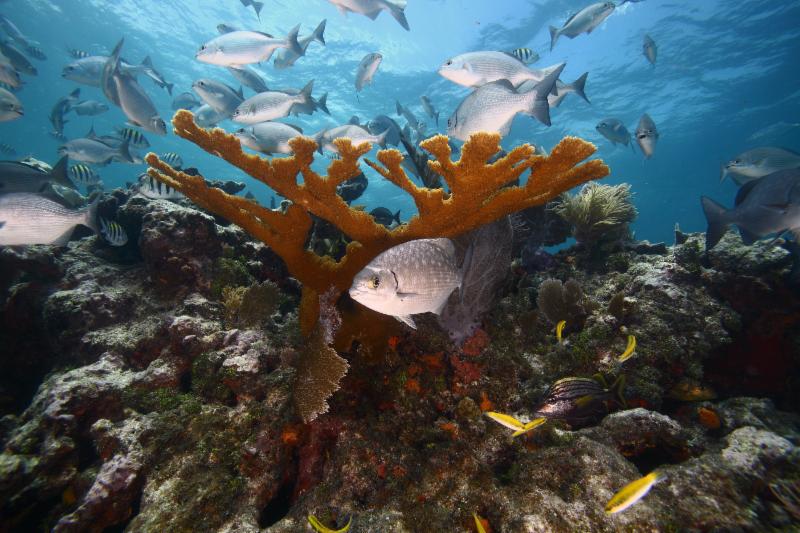
The status and conservation of reefs, mangroves and seagrasses was a key subject of the fifth annual Wetlands Workshop sponsored by the Environmental Law Institute and Stetson University College of Law's
Institute for Biodiversity Law and Policy
on Nov. 9 at Stetson's campus in Gulfport, Florida.
The workshop "Conserving the Coasts: The State of Marine Ecosystems and Coastal Compensatory Mitigation," was co-sponsored by the Environmental and Land Use Law Section of the Florida Bar and by Mechanik Nuccio Hearne and Wester, P.A. Two lectures and panel discussions followed a field trip focused on Tampa Bay Watch's aquatic restoration projects.
The lectures included Dr. Max Finlayson from Charles Sturt University, Australia, and Dr. Frank Muller-Karger, University of South Florida and lead investigator on the Sanctuaries Marine Biodiversity Observation Network (MBON) project, which GCOOS is partnered on.
Finlayson discussed climate change impacts on corals of the Great Barrier Reef and mangrove ecosystems of Kakadu National Park. He summed up his message about large-scale climate change impacts: "When we're driven by crisis it is often too late to turn back."
Muller-Karger also provided compelling information on the status and conservation of reefs. "Coral reefs are one of the most beautiful marine ecosystems that many people have a chance to visit regularly, either for fishing or diving," he said. "Around the world, coral reefs provide some form of livelihood for over 270 million people, and generate over $30 billion (U.S.) in revenue every year. Sustaining these benefits will need us to make better maps of the living and non-living resources on the reef on an ongoing basis. Most reef habitats of the world have not even been mapped once. Such observations and monitoring may help implement local programs to conserve the reefs and sustain their use as they risk more and more uses from more people, at the same time that ocean temperatures warm up and sea level rises with climate change. This affects us all in one way or another as the very reef we may want to visit as a tourist may be gone and covered by algae when we get there the next time. It is our responsibility to help these systems survive."
According to Dr. Chris Simoniello, GCOOS Outreach and Education lead who is providing support for the MBON project, "it is encouraging to see law students early in their careers taking interest in environmental issues that require global policy solutions. The climate change story can't be one of gloom and doom. These young, energetic students remind us that we need to link the environmental issues with solutions and hope."
|
GCOOS and HABs in the Gulf of Mexico
|
GCOOS recently participated in Florida Sea Grant's workshop "Red Tide Stinks! Shellfish Industry Strategies for Dealing with Harmful Algal Blooms" at the South Florida Museum
 |
|
 |
Jen Vreeland-Dawson presents during the Florida Sea Grant red tide workshop.
|
in Bradenton, Florida. The workshop included participants from government, industry and research discussing threats to the shellfish industry from Florida's red tide, as well as testing and monitoring efforts taking place around the state.
GCOOS's presentation, by Research Associate Jen Vreeland-Dawson, focused on the Harmful Algal Bloom (HAB) Integrated Observing System Planning. Projects within the scope of the system include the HABscope project led by NOAA's Dr. Rick Stumpf and GCOOS's Dr. Barbara Kirkpatrick and Bob Currier. This automated classification system for
K. brevis (the phytoplankton that causes the Gulf's red tide) is being designed to be used with minimal training and to provide real-time cell counts from sampling locations. When the tool is fully developed, it will enhance coastal monitoring efforts. GCOOS is also providing stakeholders with insight on research linked to HAB conditions such as ocean acidification through the organization's partnership with NOAA's Ocean Acidification Program (OAP) to develop the Gulf of Mexico Coastal Acidification Network (GCAN).
|
|
We conducted one of our biggest outreach events of the year -- the St. Petersburg (Florida) Science Festival, which included a student day on Friday, Oct. 20, and a public day on Saturday, Oct. 21. On student day, we used coral reefs to introduce students to one method scientists use to measure the health of ecosystems and on the public day,
We used the coral reef assessment and added it to a catch/release fishing activity designed to focus on the "M" (mathematics) in STEM education. Capitalizing on the popularity of Marvel superheroes, our activity was called the IOOS Super SySTEM and our fearless superhero-dressed team highlighted IOOS, MBON (the Marine Biodiversity Observation Network) and Animal Telemetry Network projects.
Are you looking for similar activities for a science festival in your neck of the woods? If so, GCOOS has plenty of adaptable lessons available for free on our website. If you use them, let us know -- we're also interested in seeing how the outreach materials we develop are used in settings around the Gulf.
|
NOAA Priorities: 2017-2022
|
|
NOAA Deputy Administrator Tim Gallaudet recently presented the administration's priorities for 2017 to 2022 during the fall meeting of the agency's Science Advisory Board. The NOAA priorities are:
- Leading the world in earth system observation and weather prediction;
- Minimizing impacts from severe weather;
- Increasing sustainable economic contributions of U.S. fisheries and oceans.
According to a report from the
American Institute of Physics, the priorities adopt a weather-centric approach and emphasize the economic value of oceans. They do not reference climate change, a focus of the previous administration's priorities for NOAA. When asked about this absence, Gallaudet said the administration will continue to support NOAA's climate mission.
The first and second priorities are tailored to the Weather Research and Forecasting Innovation Act, a major law enacted in April. Gallaudet said NOAA has a "specific eye in implementing everything in the [law]," including a number of provisions dealing with observations, modeling, and optimizing data collection. He welcomed the law as "a great path forward to realize the first priority to have the best [weather prediction] model in the world."
|
|
New Report Calls for National OOS Planning & Funding
|
From phys.org: A new report by the National Academies of Sciences, Engineering, and Medicine finds that continuity of ocean observations is vital to gain an accurate understanding 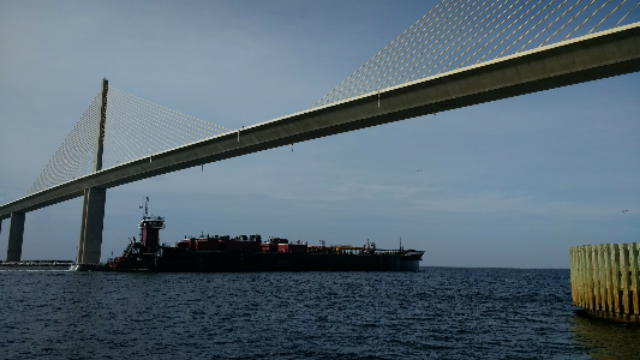 of the climate, and calls for a decadal, national plan that is adequately resourced and implemented to ensure critical ocean information is available to understand and predict future changes. of the climate, and calls for a decadal, national plan that is adequately resourced and implemented to ensure critical ocean information is available to understand and predict future changes.
The report notes that federal activities provide an opportunity for sustained and coordinated ocean-observing in the U.S., but require coordinated and high-level leadership to be effective. Additional benefits of this observational system include improvements in weather forecasting, marine resource management, and maritime navigation.
But, the report also notes,
issues related to flat or declining funding are jeopardizing the country's leadership and creating challenges in maintaining long-term ocean-related climate observations, the report says.
|
Call for Papers: Marine Technology Society Journal
|
The Marine Technology Society is soliciting papers for a special issue: Lessons Learned from Ocean Observing systems, Volume II: A Tribute to Vembu Subramanian. 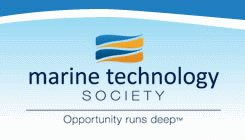 This special issue is designed to be a forum for users and operators of ocean observing systems to share what they have learned in a broader context than would be covered by papers in a science journal. Examples of "best practices" that have been developed to overcome obstacles resulting in systemic practices that the wider ocean observing community can adopt are of particular interest. This special issue is designed to be a forum for users and operators of ocean observing systems to share what they have learned in a broader context than would be covered by papers in a science journal. Examples of "best practices" that have been developed to overcome obstacles resulting in systemic practices that the wider ocean observing community can adopt are of particular interest.
Contact Guest Editor Ian Walsh or MTSJ managing editor Amy Morgante for more information.
|
New REU Program in Louisiana
|
The University of Louisiana at Lafayette has been awarded a new REU program and is seeking applicants. REU -- Research Experiences for Undergraduates -- is a National  Science Foundation program that offers funded internships for undergraduate students so they can gain meaningful experience conducting research with the help of a science mentor. Science Foundation program that offers funded internships for undergraduate students so they can gain meaningful experience conducting research with the help of a science mentor.
The new REU program at UL Lafayette is focused on the study of water and coastal processes and resources within watersheds and nearshore environments in southern Louisiana. Students accepted into this competitive program will spend eight weeks in the heart of Cajun Country in Lafayette, Louisiana, working with leading researchers in interdisciplinary fields related to coastal and watershed science.
Students will receive stipend, on-campus housing, meal allowance, and travel support. UL Lafayette is dedicated to diversity and inclusion. Underrepresented, first generation, and students from all backgrounds are highly encouraged to apply.
The application deadline for the Summer 2018 session is Feb. 15, 2018.
|
|
The Gulf Research Program now has two new social media feeds where you can learn more about funding opportunities, grant and fellowship awards and the latest in coastal science news from the Gulf and beyond.
Follow GRP on:
|
|
GOMA Photo Contest Winners
|
|
GOMA had more than 200 entries in its photo contest and recently announced the winners in their e-newsletter. We have to give a shout-out to the under-18 Best in Show winner, Cory Diaz. Cory is the daughter of Dr. Chris Simoniello, GCOOS Outreach and Education lead -- who also won first place in the data and monitoring category!
There's also plenty of other news from GOMA this month -- including meeting dates for
Alliance Priority Issue Teams, info on a new paper offering strategies for managing 45 important coastal species in the face of environmental changes and a new assessment of cumulative stressors on sea turtles.
|
|
|
|
Photo by Chris Simoniello
|
|
|
|
2018 Oil Spill Conference
|
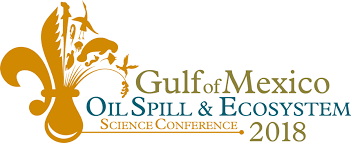 Registration is now open for the 2018 Gulf of Mexico Oil Spill and Ecosystem Science (GOMOSES) conference Feb. 5-8 in New Orleans. The title this year is "Response, Restoration, and Resiliency in the Gulf." Registration is now open for the 2018 Gulf of Mexico Oil Spill and Ecosystem Science (GOMOSES) conference Feb. 5-8 in New Orleans. The title this year is "Response, Restoration, and Resiliency in the Gulf."
Since its inception in 2013, the Conference has sought to link fundamental research on the Gulf ecosystem to practical application. The 2018 theme continues this trend, exploring how fundamental science can help restore and maintain Gulf ecosystem integrity, inform response strategies, and strengthen resilience. This year's program will also emphasize cross-cutting discussions among academics, industry, government agencies, and public interest organizations.
|
|
The National Fish and Wildlife Foundation (NFWF) has announced the award of more than $101.5 million from its Gulf Environmental Benefit Fund to 19 projects and several amendments to previously announced projects in Alabama, Florida, Louisiana, Mississippi and Texas.
The projects, developed in consultation with state and federal resource agencies, are designed to remedy harm and reduce the risk of future harm to natural resources that were affected by the 2010 Deepwater Horizon oil spill.
|

The Gulf of Mexico Alliance (GOMA) and Gulf of Mexico University Research Collaborative (GOMURC) have contracted with the Gulf Coast Ecosystem Restoration Council (Council) to assist with scientific reviews of projects and programs funded under the RESTORE Act Council-funded Restoration and Spill Impact Components (RESTORE Buckets 2 and 3). They are in the process of developing a Best Available Science reviewer database for reviews of council proposals and applications.
|
NOAA has released
a new dashboard providing direct access to the toxicity testing details and results f
rom the program developed by trustees to evaluate the impacts of the Deepwater Horizon oil spill. The trustees testing program included more than 40 species of fish, aquatic invertebrates, phytoplankton, and reptiles. More than 25 principal investigators from collaborating university, government and private laboratories and consultants conducted these studies, which include over 600 bioassays and chemical characterizations.
|
Restoration Funding Calendar
- NOAA RESTORE Act Science Program hosts a three-year calendar that consolidates planned funding opportunities
By State:
|
|
Deep Space Meets Deep Ocean
|
Observing extreme environments presents similar technological challenges to ocean and space researchers. Now, the two disciplines are working together through the ROBEX 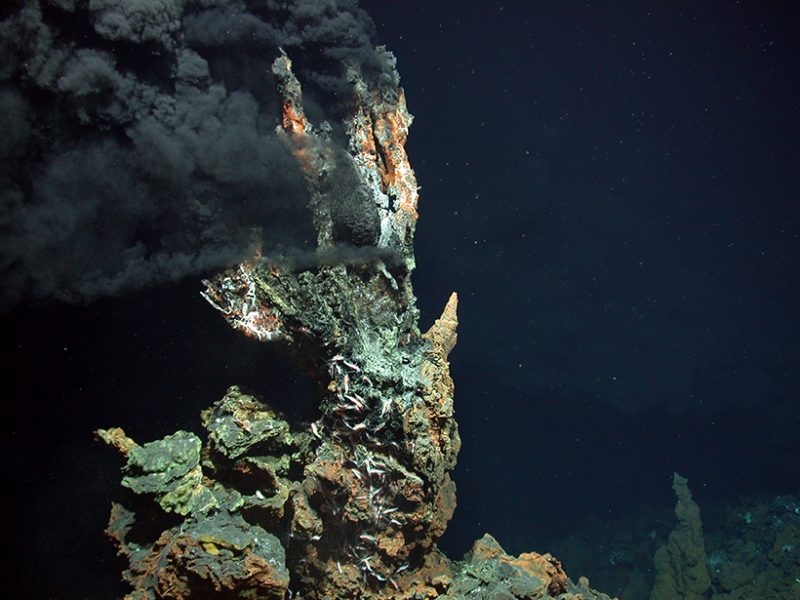 alliance (Robotic Exploration of Extreme Environments). Joint effort was the common thread of the ROBEX workshop held during this year's European Geosciences Union General Assembly. alliance (Robotic Exploration of Extreme Environments). Joint effort was the common thread of the ROBEX workshop held during this year's European Geosciences Union General Assembly.
In the picture, sea worms make their home near a black smoker hydrothermal vent. At a sensor workshop earlier this year, space scientists and ocean scientists worked to build a collaborative framework to benefit from commonalities between studying life in extreme environments on Earth and searching for life on other worlds. Credit: MARUM, University of Bremen
|
|
An Island In Louisiana's Bayou Is Vanishing, And Its Residents Are Fleeing To Higher Ground
|
(From WBUR, June 2017) Since the middle of the last century more 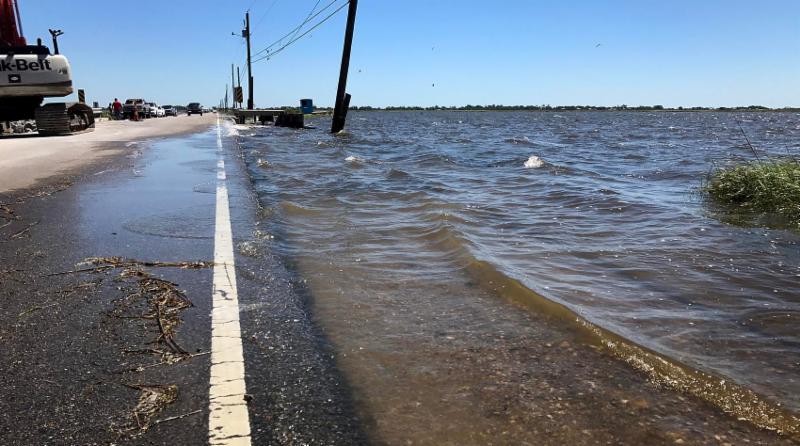 than 90 percent of Isle de Jean Charles has dissolved into the southern Louisiana bayou. than 90 percent of Isle de Jean Charles has dissolved into the southern Louisiana bayou.
The island, which is connected to the outside world by a road that's known to flood in perfect weather, is home to a tribe of Native Americans who have fished and hunted there since the 1800s.
Those who remain are barely clinging to what's left.
|
|
Hurricane Recovery Grants
|
|
In response to the impacts of Gulf Coast hurricanes Harvey and Irma on scientific research, the Gulf Research Program (GRP) is funding small grants to help with repair, replacement, or recovery of equipment, data, and/or other research materials damaged or lost due to the hurricanes and their aftermaths. These awards are intended to help scientists recover from their losses and minimize downtime for their research efforts.
|
|
Fiscal Year 2018 Environmental Literacy Grants (ELG) Funding Opportunity Now Open
|
|
The NOAA Office of Education has issued a competitive funding opportunity for projects designed to support the education of the public and/or K-12 students so they are knowledgeable of the ways in which their community can become more resilient to extreme weather events and/or other environmental hazards, and become involved in achieving that resilience.
- Pre-application deadline is Dec. 19
- Details
|
|
Coastal Ocean Science Funding Ops
|
|
The NOAA/NOS National Centers for Coastal Ocean Science (NCCOS) has announced three Federal Funding Opportunities (FFOs) on grants.gov requesting proposals for three NOAA funding programs:
|
Associate Program Officer, Energy and Environment, Gulf Research Program
|
|
The National Academy of Sciences, National Academy of Engineering, and National Academy of Medicine work together as the National Academies of Sciences, Engineering, and Medicine to provide independent, objective analysis and advice to the nation and conduct other activities to solve complex problems and inform public policy decisions. The National Academies also encourage education and research, recognize outstanding contributions to knowledge, and increase public understanding in matters of science, engineering, and medicine.
In 2013, the National Academies of Sciences, Engineering, and Medicine established the Gulf Research Program to enhance oil system safety and the protection of human health and the environment, focusing on both the Gulf of Mexico and other relevant regions of the U.S. outer continental shelf. The Program seeks to improve understanding of the region's interconnecting human, environmental, and energy systems and foster applications of these insights to benefit Gulf communities, ecosystems, and the Nation. They seek an Associate Program Officer in Energy and Environment in Washington, D.C.
|
Director, Marine Conservation Policy and Leadership, Anderson Cabot Center for Ocean Life at the New England Aquarium
|
|
The Director, Marine Conservation Policy and Leadership will play a key leadership role overseeing two emerging domains in the Anderson Cabot Center for Ocean Life at New England Aquarium (Anderson Cabot Center) Ocean Based Conservation Policy and External Affairs and the nascent Marine Conservation Leadership Program (MCLP) which develops, empowers and supports conservation leaders from around the world. These domains integrate and strengthen existing Anderson Cabot Center and New England Aquarium (Aquarium) Education Department programs to transform science into action.
The position will work closely with Aquarium and Anderson Cabot Center leadership, staff and other Aquarium departments to lead, define and implement tactical frameworks, priorities, external relationships, and short-term goals for these areas. He/she will also supervise program managers in these areas, and will report to the Aquarium's Vice President for Programs, Exhibits and Planning with additional programmatic oversight from the Vice President of the Anderson Cabot Center.
|
Research Technician (Glider Technician)
|
|
As a science-based department, Fisheries and Oceans Canada (DFO) relies on a vibrant science program to provide data and information combined with expert scientific analysis and advice to directly support decision-making as well as policy and program delivery. The Ecosystem and Oceans Science Sector (the "Science" Sector) makes up approximately one-quarter of the workforce of DFO (excluding Canadian Coast Guard) and includes research scientists and biologists with broad range of expertise in ocean and freshwater research, as well as physical scientists, chemists, engineers, hydrographers, a range of technical and other scientific support staff, managers, science advisors, and administrators.
As part of the glider program at the Institute of Ocean Sciences, and under the supervision of the Research Scientist leading the glider program, the Glider Technician will maintain and pilot DFO Pacific's small fleet of ocean gliders. This entails preparing the gliders for deployment (ballasting, programming, etc), deploying them (generally from small boats), communicating with the gliders that are at sea via satellite to monitor their progress and 'health' and alter their mission if necessary, and maintaining the necessary calibrations on the gliders' sensors (communicating with the manufacturer). The Glider Technician will also coordinate glider deployments with pilots in collaborating institutions (e.g. academic groups).
|
December
December 11-15, 2017, New Orleans, LA
Florida Sea Grant and the University of Florida IFAS Extension are hosting a Dec. 12-15 intensive workshop in Gainesville, Florida, on ArcGIS 10.5, a powerful tool for managing natural resources and guiding growth and development processes. Details
January
American Meteorological Society Annual Meeting, January 7-11, 2018, Austin, TX
February
Gulf of Mexico Oil Spill and Ecosystem Sciences, February 5-9, 2018, New Orleans, LA. Don't forget, the conference is still accepting abstracts that promote fundamental Gulf ecosystem science or link scientific results to ecosystem resilience, oil spill response, or restoration and management. The deadline to submit an abstract is September 11, 2017.
May
The joint OCEANS and Techno-Ocean meetings at the Kobe Convention Center, Kobe, Japan
|
|
Share Your News with GCOOS
|
Do you have a meeting, job or funding announcement? Please let us know so we can help spread the word. Email info, including all pertinent details and website links, to Laura Caldwell, GCOOS Staff Assistant, [email protected].
Are you starting or finishing a research project, reporting new findings, have a new publication or other big news to share with the GCOOS community? Please email our Public Relations and Content Coordinator, Nadine Slimak at Vetted Communications, [email protected].
|
|
|
|
|